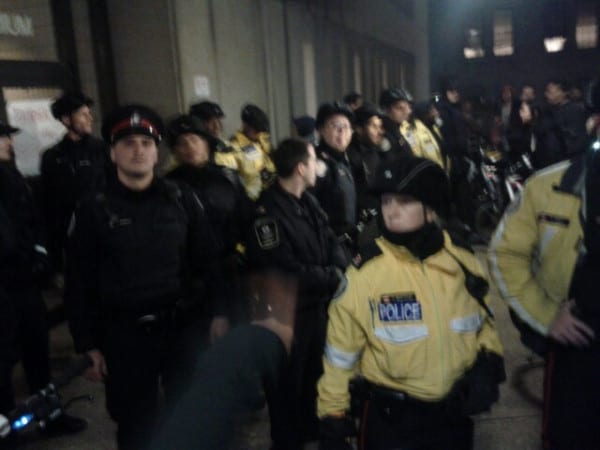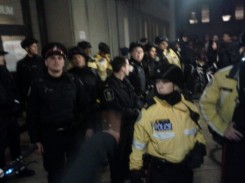Around 100 protestors disrupted a lecture given by controversial author and activist Warren Farrell at the MacLeod auditorium at U of T on Friday night.
Farrell, whose works include The Liberated Man, Why Men Are the Way They Are, and The Myth of Male Power, was on campus to give a speech outlining his theory about how males are disadvantaged in Western society. He was hosted by the Canadian Association for Equality (CAFE).
Farrell, who describes himself as a former feminist, and the only male ever to have been elected to the Board of the National Organization for Women three times, started to include men’s issues in his work about gender in the mid-1980s.
About fifteen protestors stood in front of the doors before the event, forming a barricade and blocking attendees from entering through the main doors of the auditorium. About two dozen Toronto Police Service officers were present to provide security for the event, including officers on bicycles and on horseback. U of T Campus Police were also present.
One protestor was arrested after a scuffle broke out in front of the auditorium’s doors. He was later released with no charges. Another protestor was cautioned for assault of a police officer at the back entrance. A video posted on YouTube shows event attendees entering the building, and people identified by the videographer as organizers physically assaulting protestors.
There was also significant controversy over the move by protesters to barricade the doors. Many patrons argued that the methods used by the protestors suppressed free speech and stifled debate. The protestors argued that Farrell’s talk was hate speech, and did real damage to women. Demonstrators shouted the slogan “No Hate Speech on Campus” on a number of occasions throughout the night.
Farrell’s lecture centred around ten major themes, including discussion of “men’s issues” such as video game or porn addiction, which disproportionately affects men, and boys’ relative disadvantages in education.
Other topics included the devaluing of male sexuality and life. Farrell argued that increasing rates of male impotence, increased suicide rates, and instances of men seen as heroes for taking risks with their bodies and lives, were all evidence of the disposability of men. Farrell also argued that it should be more socially acceptable for men to contribute to their families apart from working full-time.
The lecture was delayed by the crowd of protestors, who had organized on Facebook through a coalition group calling themselves “U of T Students United Against Sexism.” Protestors accused Farrell and the men’s issues awareness movement of misogyny, and of protecting and denying male privilege.
“We recognize that they [the men’s issues awareness movement] are really messed up … men are at a point of privilege, so we need to recognize privilege and become an ally [of women’s rights],” said Guled Arale, Scarborough Campus Students’ Union vice-president, external during a speech about 20 minutes before the event was scheduled to start.
Other protestors were more measured in their criticism.
Peter Hogarth, who created the Facebook page, accused the men’s issues awareness movement of splitting problems strictly along gender lines. “We [protestors] don’t want to say the gains of women have come at the expense of men, but rather the issues that men’s groups talk about are real; we’re interested [in] general equality,” he said.
Zack Morgenstern, a second-year U of T student present at the protest, said that his issue was not so much with Farrell himself, but instead promotes feminism as a more relevant issue than men’s rights.
Brad, a recently-graduated U of T graduate student, paid for his ticket to see Farrell speak. He said that gender issues were “symmetric … while women have suffered in many ways, men have as well.”
A section of Farrell’s book The Myth of Male Power that deals with date rape drew particularly vehement condemnation from the protestors. The part in question is drawn from the first words of a subsection of the book called “Date Fraud and Date Lying.”
“If a man ignoring a woman’s verbal ‘no’ is committing date rape, then a woman who says ‘no’ with her verbal language but ‘yes’ with her body language is committing date fraud. And a woman who continues to be sexual even after she says ‘no’ is committing date lying,” wrote Farrell in the 1993 book.
Farrell follows this section in his book with his own personal experience, and a set of survey statistics to illustrate this point. In an interview with The Varsity, Farrell said that he does not blame date rape on its victims, and that he only made the point that there was an “evolution of misunderstandings between communication and litigation.” He also added an example that a verbal “yes” said in the tone of “no” also means no.
“I didn’t know what they were talking about in regards to promoting rape culture,” said Iain Dwyer, a member of the CAFE board of directors, in response to claims from U of T Students Against Sexism. CAFE, he said, does not “disregard misogyny … we want to address gender issues.”
A protestor, who identified themselves as a member of ‘U of T Students Against Sexism’ submitted the following video, allegedly taken at Friday’s event:



